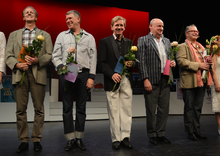|
Galenskaparna och After Shave
Galenskaparna och After Shave is the collaborative name of two Swedish comedy groups, Galenskaparna and After Shave, from Gothenburg.[1][2] In 1982 the two groups joined in order to collaborate on the revue show Skruven är lös, and the collaboration has continued.[3] Since the early 1980s, Galenskaparna och After Shave have produced nearly 28 revues, restaurant shows, and tours, as well as 8 movies, 5 television series and 30 studio albums. Galenskaparna och After Shave has made some of the biggest movie, TV, song and revue successes in Swedish history, including TV series Macken (The Petrol Station), the movie Hajen som visste för mycket (The Shark that Knew Too Much) and the revue Stinsen brinner (The Station Master is on Fire). MembersGalenskaparna is a comedy troupe which was formed in 1978. Members of the group are Anders Eriksson, his older brother Claes Eriksson and Kerstin Granlund. Granlund and Claes Eriksson had previously appeared together in a popular student comedy group called Utan Lots, 1972–77, at university. After Shave formed in 1979 as a barbershop quartet at Chalmers University of Technology in Gothenburg. Its members are Jan Rippe (bass), Knut Agnred (solo/tenor) and Per Fritzell (tenor). Peter Rangmar (baritone) was the fourth member, but died in 1997 at 41 years old. Most of the original members of the two groups are still members of Galenskaparna & After Shave; the exceptions are Rangmar, who was a member until his death, and Granlund, who left the group in the early 2000s.[3] The motor and key person of the group is often said to be Claes Eriksson, as he generally is the writer and director of the group's various productions, and also the person writing the songs for the productions.[1] The group is influenced a lot by the humour of both Monty Python and Hasseåtage, as well as Povel Ramel (in terms of his musical humour and playfulness with texts and lyrics), and also the physical comedy of Charlie Chaplin and Buster Keaton. Claes Eriksson is also a sharp political critic, and uses humour to comment on Swedish society and politics. ProductionsRevues, musical theatre
Innshows and shows
Tours
Television program
Movies
References
External links
|
||||||||||||||||||
